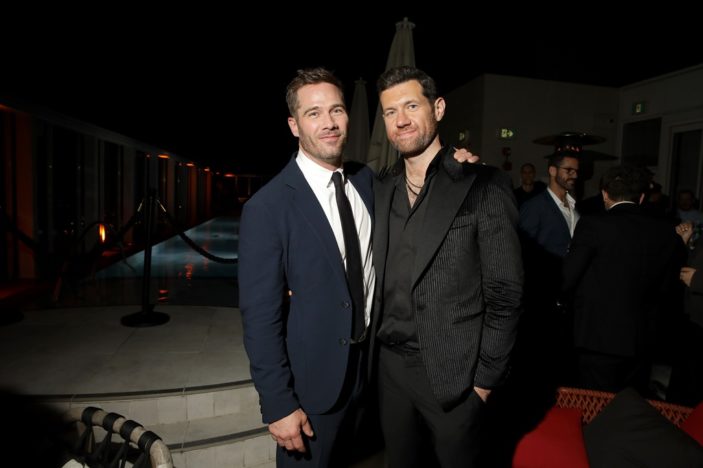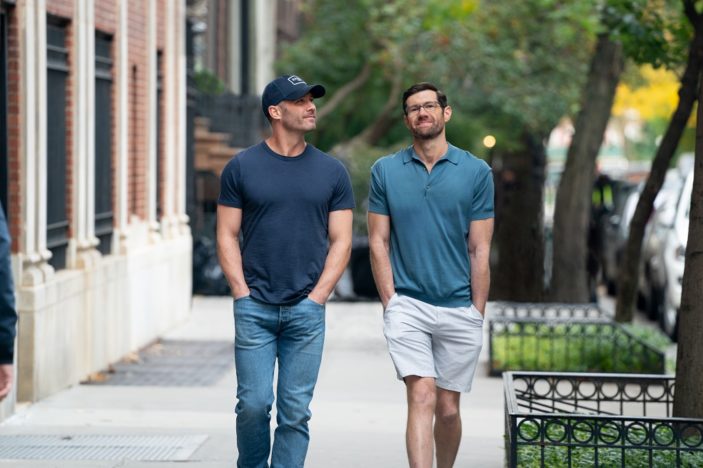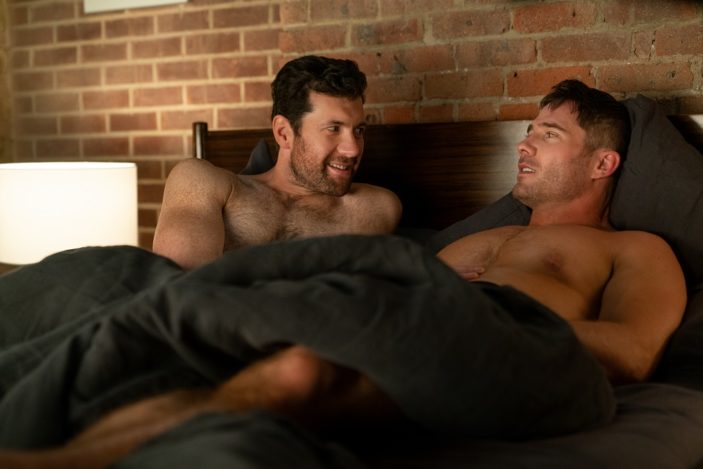
Taking his confronting, wise-cracking comedy from the street to the screen, Billy Eichner (Billy on the Street) is shattering the glass ceiling on queer comedy with the first major studio production to champion an all LGBTQ cast in Bros.
As the romantic comedy sets its local release (Universal Pictures will release the film on October 27th), Billy and co-star Luke Macfarlane have been bringing to love to Australia to talk about their groundbreaking (on-screen) romance. Touching down in Sydney, the duo spoke with our Peter Gray about embracing the so-called “conventions” of a happy ending, how they personally define romantic comedies, and the dynamics of choreographing “explosive” sex scenes.
I was mentioning this to Nick that I was at TIFF when Bros premiered and how electric that reaction was there…
Billy Eichner: Oh, it was great. It felt like a rock concert.
Luke Macfarlane: It was awesome, yeah. We were very excited by that.
It’s quite rare for a festival like that to play a comedy, let alone one such as Bros. Are you part of those conversations in having the film play at such an event?
Billy Eichner: I’m assuming Universal reached out and said “Hey, would you guys be interested in Bros?” I remember hearing that they screened it and (TIFF) really loved it. I know we also submitted it to the London Film Festival, and, initially, before they watched it they heard “Hey, this looks fun, but it’s not the normal movie we screen. We screen prestige movies and more dramatic films”, and then they screened it and loved it. And they put it into the festival as well. It’s been very cool.
Luke Macfarlane: I think it’s a testament to the intelligence of the movie. I think, right off the bat, people think it’s going to be a raunchy sex comedy, but it’s secretly – and sometimes very openly – incredibly smart.
I really appreciated that it went for what we expect traditional rom-coms to be, but it had that raunchy heart. I felt seen with this film. I was relating to it a lot…
Billy Eichner: Oh, that’s so great. Yeah, we’ve been hearing that a lot from gay men especially, and it makes sense because the central characters are gay men, so that response makes us happy.
Nick said his favourite rom-com was Saw 2, naturally. Is there a romantic comedy that you look to as a pinnacle of the genre?
Billy Eichner: There’s a bunch that I love. There’s a movie from the 80’s that I grew up watching called Broadcast News. It’s Holly Hunter and William Hurt and Albert Brooks and Joan Cusack, just this incredible cast, and you wouldn’t call it high-brow or avant-garde in any way, but it’s a big studio comedy on the surface, but in those days the characters were allowed to sound like adults and they were very dialogue-driven. That’s something that’s increasingly rare, but it’s very sophisticated and the characters were all surprisingly sophisticated under the surface. It didn’t tie up the loose ends of the movie in a cliched or convenient way, and I really always loved that.
Luke Macfarlane: It’s so funny, when I first started getting asked that question my mind immediately goes to You’ve Got Mail or When Harry Met Sally, and it got me thinking “Well, what is a romantic comedy?”, and I think of contemporary movies like The Big Sick, and I wonder is that a romantic comedy? On the plane ride over here I watched Roman Holiday and I asked “Is that a romantic comedy?”, like, I’m just not sure. I think the thing that stands out for me about romantic comedies is two very well drawn out characters and watching them figure stuff out.
Billy Eichner: In a way it might be a disservice to some movies to just throw out the word rom-com, you know? It’s such a broad term. Like Luke is saying, “What does that even mean at this point?” It’s really just watching two people fall in love. Some of it is romantic, some of it is more thoughtful or introspective, but I think there are connotations with the word rom-com that are more negative or diminish what the movie might be.

This isn’t me just kissing arse, but this was one of the funniest films I have seen. And you getting Debra Messing…
Billy Eichner: (Laughs) Oh, we had so much fun with her. She said it was the only time she’s been allowed to curse, and I think she really leaned in in a great way.
Luke Macfarlane: That was one of the days on set, and I don’t always do this when I’m not in the scene, but I specifically came to the monitor because I had to see that.
Was she someone you specifically thought of for the film?
Billy Eichner: Yeah. I knew her because she’s done a few segments of Billy on the Street over the years. She did one called “It’s Debra Messing, you gays!”, and it was one of the earlier segments we did that involved a celebrity, and gay men especially really liked it. Even then we were spoofing her persona, but Bros takes it to the next level. And then Nick and I when we were writing the movie thought it would make sense that the LGBTQ museum my character is trying to put together would inevitably have a straight celebrity ally who’s a donor, and I had worked with Debra before and I thought she was the perfect person. And then to take her image from Will & Grace and turn it on its head like that, I’m so glad it worked out as well as it did.
With these films, sex is inevitably going to be a part of it. You write these sex scenes but then comes the realisation of performing in the scene. Was there any difficulty in the choreography of something like that?
Billy Eichner: Oh, like for that big explosive moment before it gets more romantic? (Laughs) We had a list of potential positions that we thought might be funny. Some of them ended up not being funny (and) some of them ended up being really funny. But then in the moment we found a lot of it. Luke had suggestions, and he wasn’t involved in the writing process, so it was good to hear from him. We all wanted the movie to be very unapologetic and very funny, and maybe even a little provocative, so as awkward as it might’ve been, we just dove in. We just did what needed to be done for the sake of the movie.
Luke Macfarlane: But I look at it as the same from the point of the idea of two men wrestling together is not that far from most people’s first sexual encounter together. That happens.
Billy Eichner: My first gay hook-up when I was a teenager started with wrestling.

I remember watching that scene thinking this will make straight people uncomfortable, and I love that. As is said in the movie, gay sex was so much easier when straight people didn’t know about it.
Billy Eichner: (Laughs) That scene, in particular, gets some of the biggest laughs in the movie. And they’re not laughing at us, they’re laughing along with our willingness to go there. There’s a vulnerability in that too, in addition to being sexy. As funny as it is, a lot of people talk about it being actually sexy. And we don’t see that. Gay men are either sitcom characters or porn stars. There’s very little in the middle. There’s some, don’t get me wrong, especially in little indie films that cover that ground, thankfully, but there haven’t been a ton over the years.
Luke Macfarlane: Or, you know, tragic figures. Very, very tragic figures.
Is that where the notion comes from that it’s essentially something like Brokeback Mountain that really only get us attention?
Billy Eichner: Well, we say that in the movie that straight people love seeing us miserable. Happy endings don’t win Oscars. And they won’t this year again! (Laughs)
And the happy ending for this film was something of a necessity for you. Was there any reasoning behind that specificity? Did you want to punch the face of misery?
Billy Eichner: I think we just don’t have a ton of happy endings in films that centre on gay men. It’s often we’re in the closet or we’re struggling. We’re tortured. We’re dying. And those stories are important to tell, and we should keep telling them, but I just think it’s important for gay men to watch the movie and see that it’s just as valid a version of telling our story than the ones that treat us as victims. I think it’s hopeful and romantic for straight people and gay people. For everyone. That’s why I do love rom-coms, because they’re comforting and they’re warm and they’re romantic. Bros is about the good things in life, and we have so many movies about the dark underbelly of everything. Cynical stories and gritty stories and violence and crime, and all of that. And that’s all fine, but it’s just as legitimate to have a happy ending.
Luke Macfarlane: It occurred to me that that is the connective thing between (Bros and) the Hallmark films. People just want a happy ending, and that is why they keep on watching them, even though it’s kind of the same movie (laughs).
Billy Eichner: It’s interesting because Bros has gotten largely very positive reviews, but some people have criticised (how) the film starts out. My character is very anti-relationship, as is (Luke’s), and the fact they end up in love and happy has people saying “Oh, it starts out unconventional but ends in a conventional way”, and I’m like “Are we not allowed to be happy?” Is it only a legitimate piece of gay art if our characters are miserable at the end? Or unhappy? Or alone? I don’t think that’s that admirable.
I mean I would want someone to sing to me in public…
Luke Macfarlane: Right?
Billy Eichner: I don’t even know why it’s such a bad thing that the characters end up happy and together. It’s not a cheesy ending. They’re not getting married. They’re just deciding to try and make it work, and people think it’s conventional. Being happy is conventional? See a therapist!
At the beginning of Bros when your character is listing off the types of film ideas he’s expecting to be presented with, were those comments coming from a real place? Not saying you have been asked to write a vehicle where you’ll be butt-fucked by Jason Momoa, though I would put my hand up to watch that…
Billy Eichner: (Laughs) It doesn’t apply to the creative process during this movie. Universal was always very supportive. I don’t think they would have greenlit the movie if they were going to come to me and say “Don’t do this and don’t do that.” They never once said “This is too gay” or “You need to pull back.” At least I wasn’t privy to those conversations. However, it did take a studio like Universal, which has existed for over a century, to greenlight a movie like this, and none of the other major studios have, in terms of a wide theatrical release all over the world. So, in that way, in my twenty years prior to Bros I definitely have had different versions of those conversations.
Luke Macfarlane: I think it’s a really clever way, as we see at the beginning of the movie, of being self aware. The movie is kind of talking about itself. We’re letting the audience know that we know what we’re doing.
Billy Eichner: It also points to, and I don’t know if people will get this on first viewing, but when (my character) Bobby is ranting at that (movie) exec and storming out saying “Love is not love”, what we are saying is kind of correct, because later when he explodes at (Luke’s character) Aaron’s parents, even though Aaron has asked him not to, it points to a flaw in his character. Intellectually what he is saying is true, but there’s a way to communicate that in a time and a place. His journey is realising that what he’s doing, even though he’s intellectually right, he’s not communicating in the proper way. He’s not being empathetic. He’s not giving people a chance. And that’s part of his story.
Luke Macfarlane: (Leaning in) Do you want to talk more about that? (Laughs)
Billy Eichner: (Laughs) No!
It’s a good thing you have a whole movie to air all your problems.
Bros is releasing in Australian theatres on October 27th, 2022.
